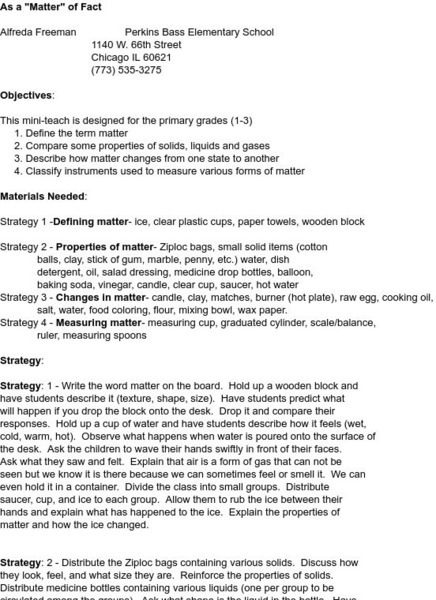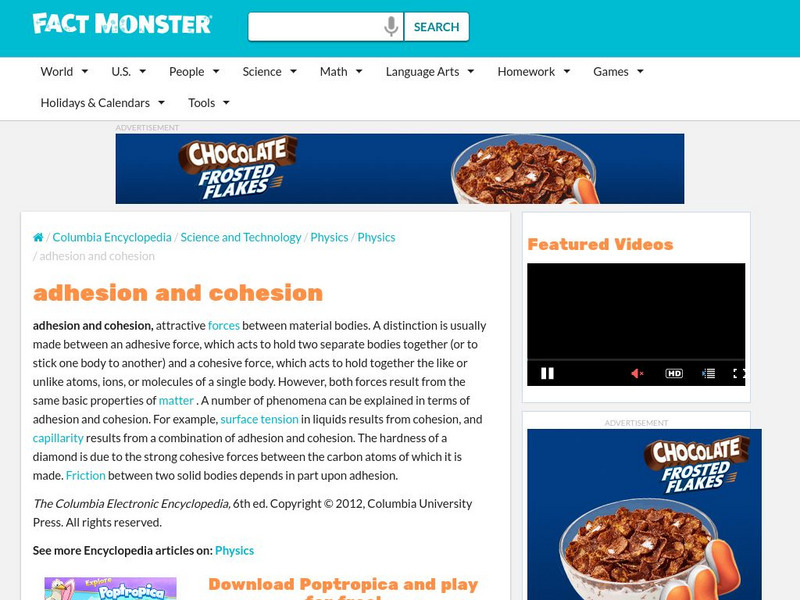Hi, what do you want to do?
Curated OER
Unknown Liquids
Students must design and conduct an experiment to determine which unknown liquid has a greater density based on basic information about the liquids and containers. Students are given specific materials to work with.
Curated OER
Chromatography
Students study about chromatography, a process used to separate mixtures.
Curated OER
Recognizing and Describing Chemical Changes
Seventh graders distinguish between physical and chemical changes in both natural and technological settings. They identify the reactants and products for a given chemical reaction. they then write simple chemical equations given the...
Curated OER
Tubular, Dude! Exploring Blood Vessels
Young scholars explore the cardiovascular system. In this human body instructional activity, students observe blood flow and study cardiovascular diseases and how they affect the human body system.
Curated OER
The Attribute Train
Students participate in a hands-on activity working with attribute blocks. After reading a story about attributes as a class, they each are given two attribute blocks. The first student lays one attribute block on the floor with the next...
Curated OER
Internet Field Trip on Fractions and Geometry
Students take an Internet field trip to research fractions. ESOL strategies include using pattern block manipulatives and pairing ESOL and non-ESOL students on computers.
Curated OER
Pancakes!
Second graders explore dietary habits by completing a cooking activity in class. For this breakfast preparation lesson, 2nd graders read several books about pancakes and maple syrup. Students utilize a wheat kit to understand the...
Curated OER
6260 Atoms Test
In these chapter test worksheets students will multiple choice questions on atoms. Students will complete 77 questions on atoms to complete the chapter test.
Curated OER
Angles: Angles, Angles, Everywhere
Students practice estiminating and measuring angles. After watching a short video, they identify angles in objects in the classroom and their homes. In groups, they participate in activities in which they are given a scenerio and are...
Curated OER
Sort It Out
Students study classification systems by sorting Legos and determining how the different pieces are classified. They list as many attributes as possible to use for sorting.
Curated OER
Rockets on a Shoestring Budgut
Students work together to create rockets on a budget. They discover the limitations that real engineers face when designing and testing their products. They discuss their findings to complete the lesson.
Texas Education Agency
Texas Gateway: Properties: Extensive and Intensive
Find out about physical and chemical properties of matter, and then compare extensive and intensive property characteristics.
Science and Mathematics Initiative for Learning Enhancement (SMILE)
Smile: As a "Matter" of Fact
In this lesson plan site, students will define matter and compare properties of solids, liquids and gases.
CPALMS
Florida State University Cpalms: Florida Students: Classifying & Comparing Physical Properties
Explore and compare physical properties of substances.
ClassFlow
Class Flow: Comparing and Contrasting Matter
[Free Registration/Login Required] This flipchart is a guided activity to help students compare different types of matter: atoms and molecules, elements and compounds, mixtures and solutions. It corresponds to Virginia science SOL 5.4.
Science Education Resource Center at Carleton College
Serc: Measuring and Comparing Matter
In this activity, learners will measure a variety of different materials from the classroom to determine how much matter is found in these materials then determine the mass of these materials using the same volume for each. The data will...
Texas A&M University
Texas A&m Univ.: Chemistry Basics: Intensive Versus Extensive Properties
Compare the intensive and extensive characteristics of matter with this side-by-side list which shows the properties of each.
TeachEngineering
Teach Engineering: Antimatter Matters
Antimatter, the charge reversed equivalent of matter, has captured the imaginations of science fiction fans for years as a perfectly efficient form of energy. While normal matter consists of atoms with negatively charged electrons...
American Chemical Society
Middle School Chemistry: Density: Sink and Float for Solids
Students determine whether an object will sink or float by comparing its density to the density of water.
Other
Science4us: Materials and Mixtures
Students play games to learn new vocabulary and practice concepts, working to sort mixtures by materials and properties, compare mass, and identify types of materials. Throughout the module, students record their thoughts and findings on...
Fact Monster
Fact Monster: Adhesion and Cohesion
The forces of adhesion and cohesion are compared and contrasted. Various phenomena which can be explained by such forces are identified and discussed.
























